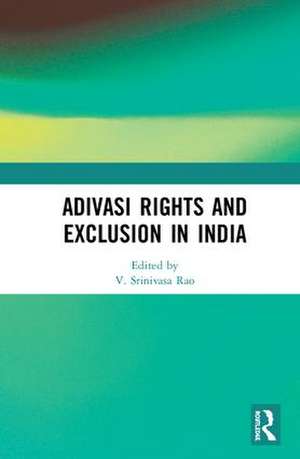Adivasi Rights and Exclusion in India
Editat de V. Srinivasa Raoen Limba Engleză Hardback – 25 sep 2018
The book argues that any laws intended to safeguard the fundamental rights of Adivasis must acknowledge the fact that their diverse and complex identities are not homogenous, and that uniform laws have failed to address their systemic marginalisation since the colonial era. This work appeals for a serious and meaningful political intervention towards tribal development.
The volume will be useful to scholars and researchers of tribal and Third World studies, sociology and social anthropology, exclusion studies and development studies.
| Toate formatele și edițiile | Preț | Express |
|---|---|---|
| Paperback (1) | 259.72 lei 6-8 săpt. | |
| Taylor & Francis – 18 dec 2020 | 259.72 lei 6-8 săpt. | |
| Hardback (1) | 895.78 lei 6-8 săpt. | |
| Taylor & Francis – 25 sep 2018 | 895.78 lei 6-8 săpt. |
Preț: 895.78 lei
Preț vechi: 1092.41 lei
-18% Nou
Puncte Express: 1344
Preț estimativ în valută:
171.40€ • 179.47$ • 142.17£
171.40€ • 179.47$ • 142.17£
Carte tipărită la comandă
Livrare economică 09-23 aprilie
Preluare comenzi: 021 569.72.76
Specificații
ISBN-13: 9781138279919
ISBN-10: 1138279919
Pagini: 382
Ilustrații: 4 Line drawings, black and white; 20 Tables, black and white; 4 Illustrations, black and white
Dimensiuni: 138 x 216 x 20 mm
Greutate: 0.58 kg
Ediția:1
Editura: Taylor & Francis
Colecția Routledge India
Locul publicării:Oxford, United Kingdom
ISBN-10: 1138279919
Pagini: 382
Ilustrații: 4 Line drawings, black and white; 20 Tables, black and white; 4 Illustrations, black and white
Dimensiuni: 138 x 216 x 20 mm
Greutate: 0.58 kg
Ediția:1
Editura: Taylor & Francis
Colecția Routledge India
Locul publicării:Oxford, United Kingdom
Public țintă
PostgraduateCuprins
List of Figures and Tables. Contributors. Foreword. Preface. Acknowledgements. List of Abbreviations. Introduction: Conceptual Framework PART I: Dichotomy of Rights and Exclusion: Adivasis in-between 1. Isolation, Inclusion and Exclusion: The Case of Adivasis in India 2. In Between Inclusion and Exclusion: The Changing face of Health and Disease Management Practices among Gonds in a Central Indian Village 3. Abandoned by Nation: ‘Adverse Possessions’ and the Denial of Tribal Rights to Habitat in Indo-Bangladesh Border 4. Inclusions and Exclusions of Adivasi Women: Subsuming Challenges from the Past, present and Future in Chhattisgarh 5. Expropriation of Land and Cultures and the Rise of the Radical Left: The Odisha Story and Beyond 6. Kidnap of Collector in Orissa: The Question of Tribal Exclusion 7. Tribal Rights and Big Capital: Critical Reflections on the Growing Dichotomy and Role of Corporate Media PART II Untouchability, Atrocities and Marginalisation: An Unspoken Empirical Veracity 8. Understanding Adivasi Dispossession from their Land and Resources in terms of ‘Investment-Induced Displacement’ 9. Livelihoods of Adivasis in India: Continuing Marginalisation 10. Adivasis Water Exchange and Caste-Based Water Lords: A Case of Groundwater Market in a Village of Gujarat, India 11. Atrocities against Adivasis: An Implicit Dimension of Social Exclusion 12. Exclusion and Persistence of Poverty among Adivasis in India: A Disaggregated Analysis PART III: Inclusive Policies: Myth or Reality 13. An Unbroken History of Broken Promises: Exploration from a Tribal Perspective 14. Language and Schooling of Adivasi Children in India: Issues Relating to Their Right to Education 15. Developmental Challenges of Nomadic and Denotified Tribes of India: With Special Reference to Andhra Pradesh 16. Decentralised Governance and Implementation of PESA in Tribal Areas: Evidences from Western Tribal Belt of India. Index.
Notă biografică
V. Srinivasa Rao is Associate Professor at the Centre for Regional Studies, School of Social Sciences, University of Hyderabad, India. Earlier he was Assistant Professor and Research Associate in the Centre for the Study of Social Exclusion and Inclusive Policy at the University of Hyderabad (2009–17) and Maulana Azad National Urdu University (2007–9) respectively. Prior to this, he undertook research while working with CARE-India on education, health, food security and livelihood activities in the tribal areas of northern Andhra Pradesh on the Sustainable Tribal Empowerment Project (STEP) assisted by the European Union (2002–7). He has published the book Primary Education in Tribal Areas in India: A Study of Community Participation in Sarva Shiksha Abhiyan. He has also published his research findings in peer-reviewed journals including Economic and Political Weekly, Journal of Educational Planning and Administration, and Indian Journal of Public Administration.
Recenzii
‘A valuable addition to the literature on different forms of dispossession of Adivasis — where even supposedly inclusive policies lead to dispossession of languages and cultures.'
Dev Nathan, Visiting Professor, Institute for Human Development, New Delhi, India; Coordinator, GPN Studies, New Delhi, India; and Visiting Research Fellow, Center on Globalization, Governance and Competitiveness, Duke University, USA
‘Indian Adivisis have been victim of imperial as well as internal colonialism in post-Independent India, with them losing their resources for livelihood and cultural moorings and experiencing exclusion even from welfare programmes. The volume with an interdisciplinary perspective highlights multiple issues that causes their exclusion.’
Ghanshyam Shah, Former National Fellow, Indian Council of Social Science Research, New Delhi, India
Dev Nathan, Visiting Professor, Institute for Human Development, New Delhi, India; Coordinator, GPN Studies, New Delhi, India; and Visiting Research Fellow, Center on Globalization, Governance and Competitiveness, Duke University, USA
‘Indian Adivisis have been victim of imperial as well as internal colonialism in post-Independent India, with them losing their resources for livelihood and cultural moorings and experiencing exclusion even from welfare programmes. The volume with an interdisciplinary perspective highlights multiple issues that causes their exclusion.’
Ghanshyam Shah, Former National Fellow, Indian Council of Social Science Research, New Delhi, India
Descriere
The book examines the processes and impacts of exclusion on indigenous groups in India and what repercussions these have for their constitutional rights. It does so through case studies from different parts of India. It will be useful to scholars and researchers of sociology, social anthropology, exclusion studies and development studies.
